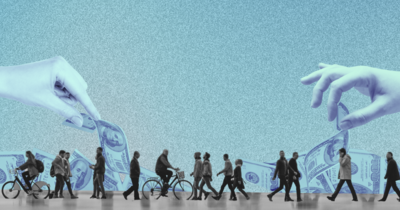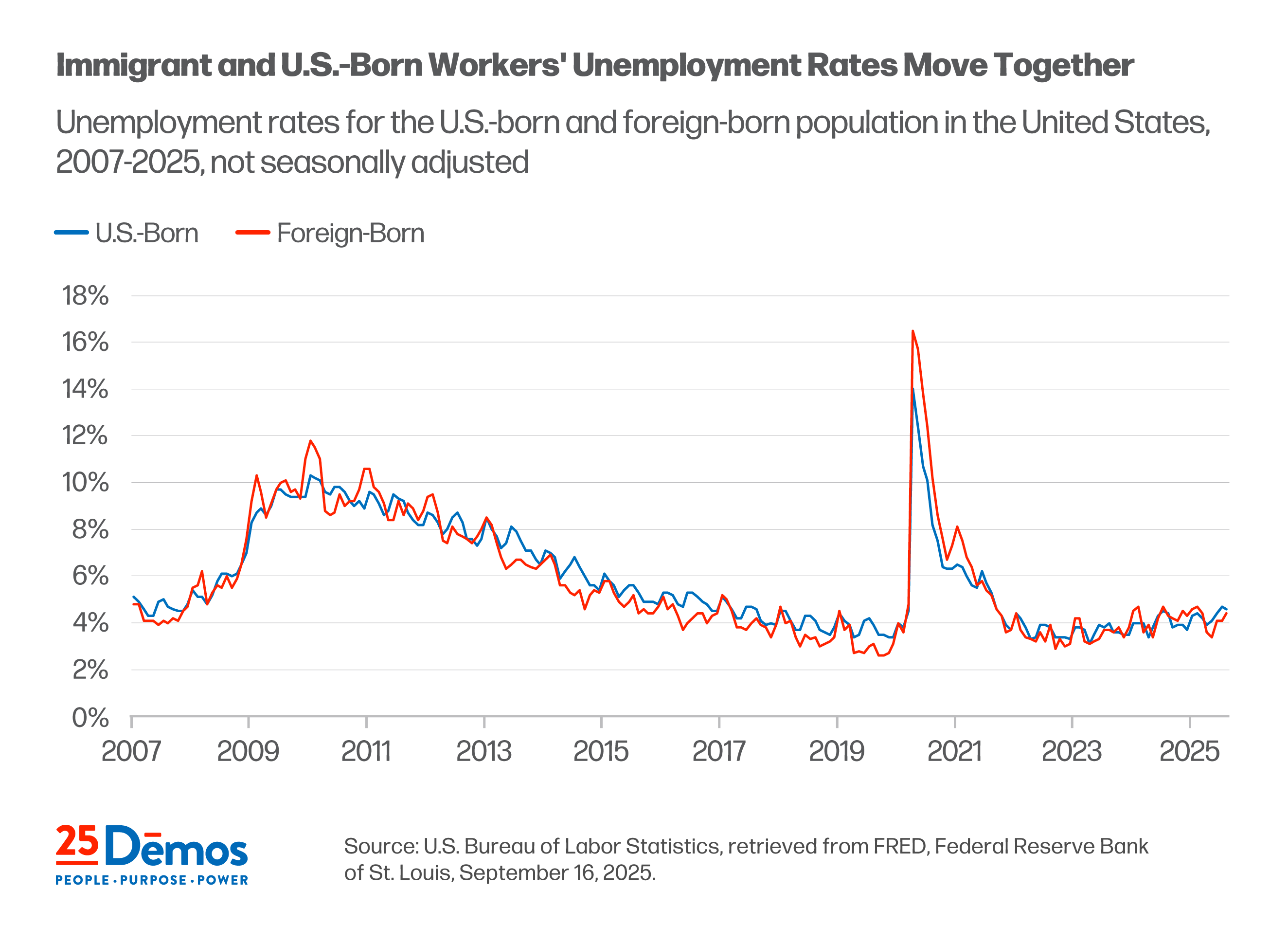
Workers are Losing Out, But It's Not Because of Immigrants
Structural imbalances—not immigrants—are what keeps working people from seeing their fair share of economic gains.

Typically, the Bureau of Labor Statistics (BLS) releases its monthly jobs report the first Friday of the month, providing the latest figures on unemployment and job growth. But with the government shutdown, these numbers are on hold, leaving policymakers, businesses and the public without critical insight into the state of the labor market. Without reliable data, the risk of misjudging the state of the economy rises, making it harder for decision makers to respond effectively and increasing the likelihood of costly errors. Beyond delaying key economic data, the shutdown directly affects hundreds of thousands of federal employees, many of whom are furloughed or working without pay for the duration of the shutdown, creating real economic strain for government workers. At the same time, the BLS is being threatened by the current administration. These pressures come in the wake of the Trump Administration's escalating anti-immigrant agenda that actively targets immigrant communities, which could further distort economic outcomes.
One of the Trump Administration's central lies—that immigrants "take jobs" from U.S.-born workers— reinforces its escalating, harmful actions against immigrant communities. The data tell a different story. The BLS tracks unemployment for U.S.-born and foreign-born workers. As shown below in this month’s indicator chart, these rates rise and fall together. The rates have tracked closely over the last twenty years, going through the same peaks and troughs.
Scapegoating immigrants doesn't just hurt immigrant communities—it undermines everyone's economic wellbeing.
What does this tell us? The data suggest that foreign-born and U.S.-born workers aren't in competition; instead, their unemployment rates tend to rise and fall together. If anything, immigrants sustain jobs growth by filling labor shortages in essential but undervalued sectors like agriculture, construction, and care work. When immigration slows, the whole economy suffers. Declines in immigration have put a strain on overall GDP growth and have slowed job growth in industries that heavily depend on immigrant labor. In other words, scapegoating immigrants doesn't just hurt immigrant communities—it undermines everyone's economic well-being.
Immigrants aren't driving wage stagnation or job precarity. The real economic issues are structural, and those structures have been fashioned by a concentration of wealth and power among the ultra-wealthy and corporations. Union membership is at historic lows, leaving workers with less bargaining power. Laws protecting workers are weak and underenforced. Wage theft costs workers in the U.S. $50 billion each year, surpassing all robberies, burglaries, and motor vehicle thefts combined. A rise in corporate concentration has shifted power further toward employers. Profits increasingly flow to CEOs instead of the people who actually perform the majority of the labor. Data on CEO pay highlights this gap: from 1978 to 2023, CEO compensation rose 1,085 percent, while typical worker pay (average compensation for full-time, full-year production or non-supervisory employees) rose just 24 percent during that same time period.
These structural imbalances—not immigrants—are what keeps working people from seeing their fair share of economic gains.
These actions are inhumane and are likely to have ripple effects that distort our understanding of the economy itself, hampering our decision-making and understanding of reality.
The Trump Administration's immigration agenda combines dangerous rhetoric with harmful policy to inflict direct harm on immigrant communities, destabilizing the broader economy in the process. Raids have expanded to cities like Chicago, Ellabell, and Boston, expanding a violent deportation regime that's sowing fear and destabilizing communities across the country. Adding fuel to the fire, a recent Supreme Court ruling lifted a federal court order that had barred immigration agents in Los Angeles from racial profiling. These actions are inhumane and are likely to have ripple effects that distort our understanding of the economy itself, hampering our decision-making and understanding of reality.
When people live in a climate of distrust, research shows they may be less likely to respond to surveys. Today, immigrant communities are experiencing heightened levels of fear amidst enforcement crackdowns, raids, and harassment in this moment. In short, trust levels are low. This makes it even harder to capture accurate economic data. More immediately, these raids, deportations, and detentions will cause immense economic damage. At the same time, threats to the BLS' independence raise another danger. If the agency's integrity is compromised—including through moves like firing of its leadership because of the way the data looked—the jobs data that policymakers and the public rely on could be undermined.
An economy built on exclusion is not a strong economy—it's a broken one.
Immigrant workers are not hurting U.S. workers. What threatens all working peoples' livelihoods are the attacks on workplace protections, the erosion of unions, and the siphoning of wealth and power to corporations and those at the very top. An economy built on exclusion is not a strong economy—it's a broken one. When all workers can participate fully, safely, and fairly, the benefits don't just stay with them but ripple outward to strengthen our communities and the economy as a whole. The current government shutdown is yet another threat—both to the livelihoods of federal employees working without pay and to the ability to monitor and address broader economic challenges through timely, accurate data.



